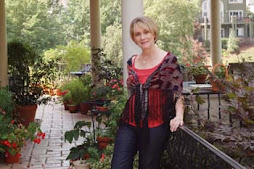
Today on Words to Go kicks off a week of asking authors what they’ve done to simplify life. I created a poll to the right of these chats. Might I add that although I’ve written on the disciplines (accomplished only when life is simplified) that as soon as I get untangled from the weights and obligations, the temptation to complicate life returns with a vengeance. Novelist Cara Putnam knows this very well. Cara could you share what led you to embrace a simpler life?
CARA: Patty, this is a great question and one I wrestle with. Anyone who knows me would tell you I have a hard time saying no. Over-commitment has been the challenge of my adult life.
PATTY: I wrestle too. And it seems that when I divested of all that did not tie in directly to my writing, here came the deluge and sometimes in a very demanding voice.
CARA: Last year the issue came to a point I couldn't ignore it. I had a baby and two books release as well as started teaching an MBA class -- all in a two-week period. Then I had three books due in three months along with two more classes -- and an infant who still hadn't figured out how to sleep through the night.
PATTY: Teaching college was the final brick in my load too.
CARA: Not to mention a daughter on a gymnastics team, homeschooling, church responsibilities, home life, being a wife. My plate teetered on breaking into pieces.Talk about overload.
PATTY: They do grow up. College is the best sitter I’ve ever had.
CARA: So I'm on a journey to learn how to rest.
PATTY: What calms your spirit, Cara?
CARA: A verse that God's pulled to the forefront as I'm on this journey is Isaiah 30:15: This is what the Sovereign LORD, the Holy One of Israel, says:
"In repentance and rest is your salvation,
in quietness and trust is your strength,
but you would have none of it.”
PATTY: Yet, it seems we have to grant permission to the self to do this. What is the challenge of this verse?
CARA: In quietness and trust is your strength. That's such a challenging concept. How do we live in a way that no matter how Type A our personality, we always trust God for our strength. That we learn to be quiet even if He's given us a Martha personality.
PATTY: Hand going up.
CARA: What I'm learning is that while God definitely gave me this personality...and a large component of that is being a doer, someone who sees a need and steps in, that doesn't mean He wants me to do everything. Instead, He wants me to focus on the tasks He has for me. And His tasks are not necessarily every task that someone thinks I should do.
PATTY: The ones to watch out for are the individuals—God love them—who neglect to plan in advance. And then there are those who are probably being nudged by God into an arena, but they’re the Jonahs who decided to not only obey and do it, but lay the task in another’s lap. My new banner is not to enable either of these types of folks. And it’s been a battled. My focus is on writing, but because I work at home, folks tend to think that I’m available for everything.
CARA: I'm also focusing on the activities our kids are in. Abigail, my 8 year old, had to make a tough decision in the fall between ballet and gymnastics. Part of me really wanted to make it possible for her to continue to do both, but she'd been invited to higher levels with both activities that required a much bigger time commitment. She made the choice, and our life as a family was less complicated. Now that challenge is multiplying as her 5 year old brother starts t-ball. Thank goodness our almost one year old isn't old enough for activities yet!
PATTY: We cut back on the athletics when it seemed evident our kids were more talented in the arts. It was a wise decision as both sons have scholarships in the arts now.
CARA: I've also consciously worked on how to say no. That two-letter word is extremely hard for me to say, but as I practice, it's slowly becoming an option.
PATTY: It gets easier with practice.
CARA: I've also become more intentional about involving others in leadership to help remove some of the lie that I'm the only one who can do certain things like teach classes at church. There are so many people that God has gifted, but they don't see it. So I love to help pull those gifting out of them.
PATTY: Yes, I’m happier now too as an “adviser.”
CARA: And then there's that wonderful invention called the crockpot. My friend Heather Corbin has a ministry for moms www.simplefamilysuppers.com that has been a lifesaver for this person who hates grocery shopping and figuring out what's for supper at 5 p.m. She sends out monthly menus with shopping lists and recipes and it's been a lifesaver by removing one stressor from my days -- when I remember to use it LOL
PATTY: Thank you so much for sharing that link.
CARA: I've also started being much more intentional about having the older two help with chores. They are old enough and it's a help. It also means that I've relaxed my standards a tad -- perfection isn't as important as the peace of a clean house without the stress of trying to do it all to an impossible standard. As the sign says, if you want to see my house, make an appointment. If you want to see me, come on over.
PATTY: It’s actually part of character training to have children participate in the household chores. And, especially sons, need to realize that what they live in is as much their responsibility as females. How is your life different now and what about simplifying has enriched your life?
CARA: There is a certain level of pandemonium that young families have, but as I seek to simplify life, my stress level has lowered -- most of the time. There are still points particularly when a deadline looms and I'm working late into the night that I have to watch myself. But as I try to adopt simplicity, the tenor of our home has improved.
PATTY: Learning that every surface doesn’t have to be spit-shined is a weight off. Cara and I give everyone reading this the imperfection of a slightly cleaned home.
I was killing myself on Saturdays trying to clean every baseboard and the tops of doorposts. Now I focus on one area on Saturday morning and will get to the rest in the following Saturdays. And for big chores, like cleaning out closets, I drop the regimen until the big chores are finished.
CARA: I love knowing that I don't have to be perfect. Instead, I just need to keep seeking to obey God and ask for His wisdom on what our family should do at this season.
PATTY: Great wisdom from a mother of young children. Thank you, Cara!
CARA: Thank you, Patty. And I’m giving away two books today.
PATTY: We love you anyway, but thank you for your generosity.
CARA: I’m giving away Deadly Exposure for lovers of romantic suspense. And I’ll give away Canteen Dreams for historical romance.
PATTY: We entertain lovers of all genres here at Words to Go. Thank you so much, Cara.
Tomorrow novelist Susan Davis will be sharing her thoughts and wisdom as we continue in our very practical discussion, “The Simple Life.”
.jpg)
.jpg)




















